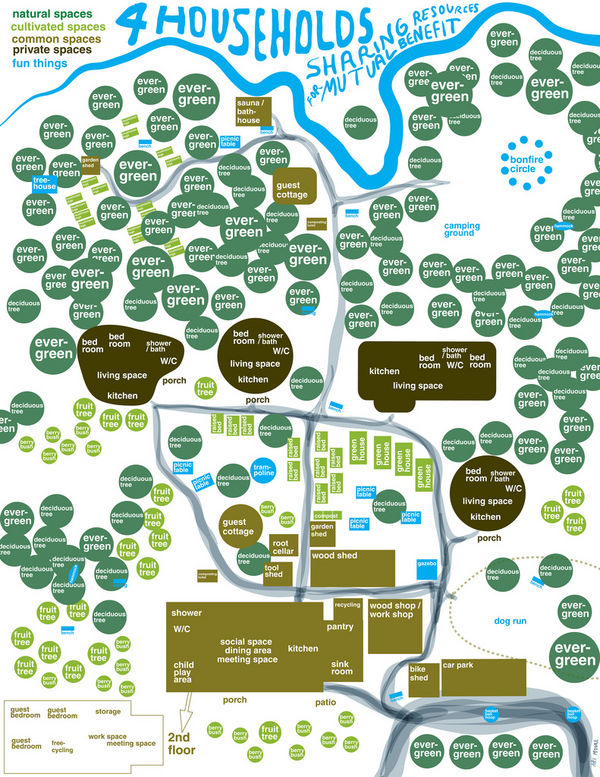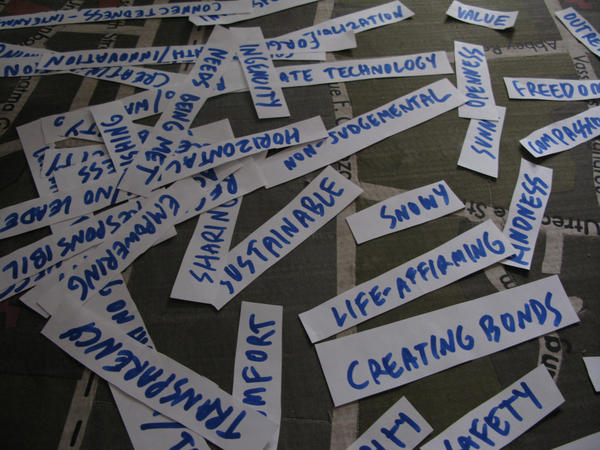Photo credit: Shira Golding.
The Fall issue of Grassroots Economic Organizing (GEO) covers the relationship between intentional communities and solidarity economics. Topics include ecovillages, cohousing setups, housing cooperatives, and the value of community. What's important to remember about intentional communities is that they address social, political, environmental, and economic challenges in one fell swoop. There's a lot to learn about social change from intentional communities. Here's GEO's top ten articles from their Fall issue:
1. Pathfinding a Soft-landing to Energy Dissent by Laird Schaub
Intentional communities come in myriad different shapes, sizes, and scenarios. What they share is a commitment to doing things together — a concept which has caused the model's popularity to double in the past five years.

Photo credit: arimoore / Foter / CC BY-NC-SA.
2. Dandelion Village: Building an Ecovillage in Town by Maggie Sullivan
Communities Magazine, Issue #156, Fall 2012.
Dandelion Village successfully navigated the legal hoops to form an ecovillage within the city of Bloomington, Indiana, and their success can be replicated elsewhere.
3. Making Cohousing Affordable: Strategies for Success by Betsy Morris
(This is Part 1 of a series. Here are links to Parts 2 and 3.) Cohousing Magazine, July 2007.
Making cohousing affordable to the widest possible number of people continues to be of intense interest to prospective community members. This piece identifies strategies used by more than 30 communities to include households at lower-income levels.
4. Dancing Rabbit by JaiJai Noire
Dancing Rabbit is a rural ecovillage and intentional community of about 70 people in northeastern Missouri. In Part I, co-founder Tony Sirna showcases life and work at Dancing Rabbit including its mix of normal and gift economy along with their own local currency. In Part II, Tony talks with a group in Berkeley, California.
5. Community, Economics, and Solidarity by Michael Johnson
Most of the various approaches to alternative economics share several core convictions: that the whole idea of “economics” should be oriented toward cooperation and solidarity; that alternative economic networks need to have strong roots in flesh-and-blood communities; and that local, alternative enterprises need to network with each other and upward regionally.
6. Community as Crucible: An Interview with Laird Schaub, Sandhill Community, by Helen Forsey
FIC Communities Directory
Laird Schaub: “One of the fundamental choices that groups must make is how close they want to be; what level of engagement is desired. Is there a commitment to examining the feelings that come up around interactions in the group? I know of no more exciting products of community than the power of high-level communication and well-made decisions.”
7. Community as Crucible: Video Interview with George Caneda, Ganas Community, by David Sheen
George Caneda: “We are hitting against our own limitations constantly. You cannot force a change, you cannot create a change because we are tainted with the elements of the culture we grew up with. In transforming ourselves, we create a new context."
8. ZEGG Forum: A Ritualized Form of Communication for Larger Groups by Ina Meyer-Stoll and Achim Ecker, ZEGG Community, Germany
ZEGG ecovillage in Germany developed its own form of transparent communication, which is now being adopted worldwide by various social networks and communities.
9. Social Permaculture by Starhawk
Communities Magazine, Issue 153, Winter 2011.
Most permaculturalists are expert at understanding the relationships between land forms and water harvesting, or between soil micro-organisms and plant health. But when it comes to our human relationships, we often founder. Nurturing the garden is a lot easier than nurturing our connections to people.
10. Communities: Exploring Cooperative Culture by Chris Roth
Communities is a journal dedicated to exploring “life in cooperative culture” through articles that delve below the surface, describing the challenges — as well as joys — of cooperation. Contributors include people who live or have lived in community and anyone else with insights relevant to cooperative living or shared projects.









